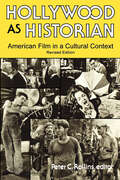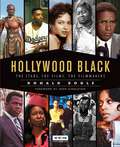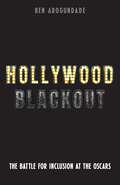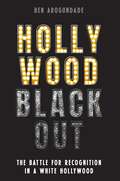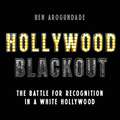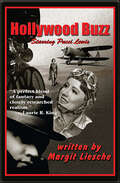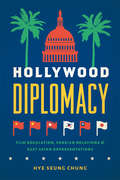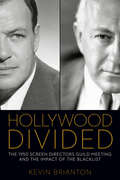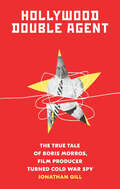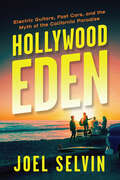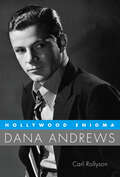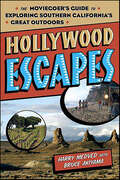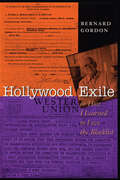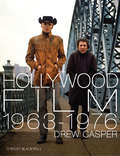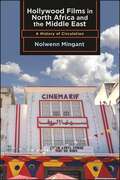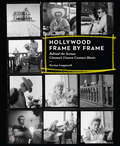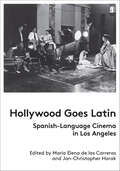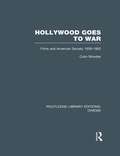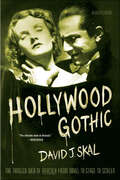- Table View
- List View
Hollywood Angels: Historical Cozy Mystery (Mercy Allcutt Mystery #8)
by Alice DuncanTalent Scout Found Murdered in Hollywood Angels, a Historical Cozy Mystery from Alice DuncanLos Angeles, California, January 1927Mercy Allcutt’s friend, Lulu LaBelle, has an unwelcomed encounter with an alleged talent scout, producer, and director in the burgeoning motion-picture business in Los Angeles.When the philandering producer is found dead in his office, police arrest Lulu when witnesses report seeing Lulu coming and going from the office.With her friend accused of murder, Mercy comes to Lulu’s aid and begs her employer, Ernie Templeton, PI, for help. But uncovering secrets can be a risky business. Publisher Note: Readers who enjoy cozy mysteries in historical settings will surely appreciate the Mercy Allcutt series set in 1920s Los Angeles, California. No vulgarity or explicit sex for those who appreciate a clean and wholesome read.The Mercy Allcutt Mystery SeriesLost Among the AngelsAngels FlightFallen AngelsAngels of MercyThanksgiving AngelsAngels AdriftChristmas AngelsHollywood Angels
Hollywood As Historian: American Film in a Cultural Context
by Peter C. Rollins“A commendably comprehensive analysis of the issue of Hollywood’s ability to shape our minds . . . invigorating reading.” ?BooklistFilm has exerted a pervasive influence on the American mind, and in eras of economic instability and international conflict, the industry has not hesitated to use motion pictures for propaganda purposes. During less troubled times, citizens’ ability to deal with political and social issues may be enhanced or thwarted by images absorbed in theaters. Tracking the interaction of Americans with important movie productions, this book considers such topics as racial and sexual stereotyping; censorship of films; comedy as a tool for social criticism; the influence of “great men” and their screen images; and the use of film to interpret history. Hollywood As Historian benefits from a variety of approaches. Literary and historical influences are carefully related to The Birth of a Nation and Apocalypse Now, two highly tendentious epics of war and cultural change. How political beliefs of filmmakers affected cinematic styles is illuminated in a short survey of documentary films made during the Great Depression. Historical distance has helped analysts decode messages unintended by filmmakers in the study of The Snake Pit and Dr. Strangelove. Hollywood As Historian offers a versatile, thought-provoking text for students of popular culture, American studies, film history, or film as history. Films considered include: The Birth of a Nation (1915), The Plow that Broke the Plains (1936), The River (1937), March of Time (1935-1953), City Lights (1931), Modern Times (1936), The Great Dictator (1940), The Grapes of Wrath (1940), Native Land (1942), Wilson (1944), The Negro Soldier (1944), The Snake Pit (1948), On the Waterfront (1954), Dr. Strangelove (1964), Who’s Afraid of Virginia Woolf? (1966), and Apocalypse Now (1979).“Recommended reading for anyone concerned with the influence of popular culture on the public perception of history.” ?American Journalism
Hollywood Black: The Stars, the Films, the Filmmakers (Turner Classic Movies)
by Donald BogleThe films, the stars, the filmmakers-all get their due in Hollywood Black, a sweeping overview of blacks in film from the silent era through Black Panther, with striking photos and an engrossing history by award-winning author Donald Bogle.The story opens in the silent film era, when white actors in blackface often played black characters, but also saw the rise of independent African American filmmakers, including the remarkable Oscar Micheaux. It follows the changes in the film industry with the arrival of sound motion pictures and the Great Depression, when black performers such as Stepin Fetchit and Bill "Bojangles" Robinson began finding a place in Hollywood. More often than not, they were saddled with rigidly stereotyped roles, but some gifted performers, most notably Hattie McDaniel in Gone With the Wind (1939), were able to turn in significant performances.In the coming decades, more black talents would light up the screen. Dorothy Dandridge became the first African American to earn a Best Actress Oscar nomination for Carmen Jones (1954), and Sidney Poitier broke ground in films like The Defiant Ones and 1963's Lilies of the Field. Hollywood Black reveals the changes in images that came about with the evolving social and political atmosphere of the US, from the Civil Rights era to the Black Power movement. The story takes readers through Blaxploitation, with movies like Shaft and Super Fly, to the emergence of such stars as Cicely Tyson, Richard Pryor, Eddie Murphy, and Whoopi Goldberg, and of directors Spike Lee and John Singleton.The history comes into the new millennium with filmmakers Barry Jenkins (Moonlight), Ava Du Vernay (Selma), and Ryan Coogler (Black Panther); megastars such as Denzel Washington, Will Smith, and Morgan Freeman; as well as Halle Berry, Angela Bassett, Viola Davis, and a glorious gallery of others.Filled with evocative photographs and stories of stars and filmmakers on set and off, Hollywood Black tells an underappreciated history as it's never before been told.
Hollywood Blackout: The battle for recognition in a white Hollywood
by Ben ArogundadeOn 29 February 1940, African American actor Hattie McDaniel became the first person of colour, and the first Black woman, to win an Academy Award. The moment marked the beginning of Hollywood's reluctant move toward diversity and inclusion. Since then, minorities and women have struggled to attain Academy Awards recognition within a system designed to discriminate against them. For the first time, Hollywood Blackout reveals the untold story of their tumultuous journey from exclusion to inclusion; from segregation to celebration. Author Ben Arogundade interweaves the experiences of Black actors and filmmakers with those of Asians, Latinos, South Asians, indigenous peoples and women. Throughout the decades their progression to the Oscars podium has been galvanized by defiant boycotts, civil rights protests and social media activism such as #OscarsSoWhite.Whether you are a film fan, history lover or diversity advocate, Hollywood Blackout is the quintessential choice for all those who wish to know the real story of Hollywood, the Oscars and the talents who fought to make change.
Hollywood Blackout: The battle for recognition in a white Hollywood
by Ben ArogundadeOn 29 February 1940, African American actor Hattie McDaniel became the first person of colour, and the first Black woman, to win an Academy Award. The moment marked the beginning of Hollywood's reluctant move toward diversity and inclusion. Since then, minorities and women have struggled to attain Academy Awards recognition within a system designed to discriminate against them. For the first time, Hollywood Blackout reveals the untold story of their tumultuous journey from exclusion to inclusion; from segregation to celebration. Author Ben Arogundade interweaves the experiences of Black actors and filmmakers with those of Asians, Latinos, South Asians, indigenous peoples and women. Throughout the decades their progression to the Oscars podium has been galvanized by defiant boycotts, civil rights protests and social media activism such as #OscarsSoWhite.Whether you are a film fan, history lover or diversity advocate, Hollywood Blackout is the quintessential choice for all those who wish to know the real story of Hollywood, the Oscars and the talents who fought to make change.
Hollywood Blackout: The battle for recognition in a white Hollywood
by Ben ArogundadeOn 29 February 1940, African American actor Hattie McDaniel became the first person of colour, and the first Black woman, to win an Academy Award. The moment marked the beginning of Hollywood's reluctant move toward diversity and inclusion. Since then, minorities and women have struggled to attain Academy Awards recognition within a system designed to discriminate against them. For the first time, Hollywood Blackout reveals the untold story of their tumultuous journey from exclusion to inclusion; from segregation to celebration. Author Ben Arogundade interweaves the experiences of Black actors and filmmakers with those of Asians, Latinos, South Asians, indigenous peoples and women. Throughout the decades their progression to the Oscars podium has been galvanized by defiant boycotts, civil rights protests and social media activism such as #OscarsSoWhite.Whether you are a film fan, history lover or diversity advocate, Hollywood Blackout is the quintessential choice for all those who wish to know the real story of Hollywood, the Oscars and the talents who fought to make change.
Hollywood Blackout: The battle for recognition in a white Hollywood
by Ben ArogundadeOn 29 February 1940, African American actor Hattie McDaniel became the first person of colour, and the first Black woman, to win an Academy Award. The moment marked the beginning of Hollywood's reluctant move toward diversity and inclusion. Since then, minorities and women have struggled to attain Academy Awards recognition within a system designed to discriminate against them. For the first time, Hollywood Blackout reveals the untold story of their tumultuous journey from exclusion to inclusion; from segregation to celebration. Author Ben Arogundade interweaves the experiences of Black actors and filmmakers with those of Asians, Latinos, South Asians, indigenous peoples and women. Throughout the decades their progression to the Oscars podium has been galvanized by defiant boycotts, civil rights protests and social media activism such as #OscarsSoWhite.Whether you are a film fan, history lover or diversity advocate, Hollywood Blackout is the quintessential choice for all those who wish to know the real story of Hollywood, the Oscars and the talents who fought to make change.
Hollywood Blockbusters: The Anthropology of Popular Movies
by Peter Wogan David SuttonCertain Hollywood movies are now so deeply woven into the cultural fabric that lines of their dialogue - for example, 'Make him an offer he can't refuse' - have been incorporated into everyday discourse. The films explored in this book, which include The Godfather, Jaws, The Big Lebowski, Field of Dreams and The Village, have become important cultural myths, fascinating windows into the schisms, tensions, and problems of American culture. Hollywood Blockbusters: The Anthropology of Popular Movies uses anthropology to understand why these movies have such enduring appeal in this age of fragmented audiences and ever-faster spin cycles. Exploring key anthropological issues from ritual, kinship, gift giving and totemism to literacy, stereotypes, boundaries and warfare, this fascinating book uncovers new insights into the significance of modern film classics for students of Film, Media, Anthropology and American Cultural Studies.
Hollywood Buzz (Pucci Lewis Mysteries #0)
by Margit LieschePucci Lewis was used to ferrying fighter planes and undercover work. But it is the dark hours of WWII, and Hollywood's biggest stars, studio moguls, and Washington bureaucrats are working hand-in-glove to merge entertainment and propaganda. Pucci has been dispatched to the First Motion Picture Unit, where a make-or-break documentary on the Women Airforce Service Pilots (WASPs) is underway.Pucci is stepping in for a sister-WASP, now hospitalized in critical condition after an all-too-deliberate plane crash. But who's the saboteur? Why the cover-up? Pucci is drawn into a high-profile homicide. A big-name director has been murdered, possibly by Nazi operatives. Military intelligence wants Pucci to learn what she can from her inside position.Bela Lugosi is a frequent visitor to the Beverly Hills mansion where Pucci is temporarily billeted. His niece, a rising starlet and also the housekeeper, has a history with the Hungarian resistance. But Pucci doesn't trust the girl. Can Pucci steadfastly maneuver through movie land and its narcissistic denizens, finally unraveling the uncertainties to prove she has the right stuff?
Hollywood Diplomacy: Film Regulation, Foreign Relations, and East Asian Representations
by Hye Seung ChungHollywood Diplomacy contends that, rather than simply reflect the West’s cultural fantasies of an imagined “Orient,” images of Chinese, Japanese, and Korean ethnicities have long been contested sites where the commercial interests of Hollywood studios and the political mandates of U.S. foreign policy collide, compete against one another, and often become compromised in the process. While tracing both Hollywood’s internal foreign relations protocols—from the “Open Door” policy of the silent era to the “National Feelings” provision of the Production Code—and external regulatory interventions by the Chinese government, the U.S. State Department, the Office of War Information, and the Department of Defense, Hye Seung Chung reevaluates such American classics as Shanghai Express and The Great Dictator and applies historical insights to the controversies surrounding contemporary productions including Die Another Day and The Interview. This richly detailed book redefines the concept of “creative freedom” in the context of commerce: shifting focus away from the artistic entitlement to offend foreign audiences toward the opportunity to build new, better relationships with partners around the world through diplomatic representations of race, ethnicity, and nationality.
Hollywood Divided: The 1950 Screen Directors Guild Meeting and the Impact of the Blacklist (Screen Classics)
by Kevin Brianton“Brianton’s well-documented study of a Hollywood controversy delves into one example of the post-WWII Red Scare” (Publishers Weekly).On October 22, 1950, the Screen Directors Guild (SDG) gathered for a meeting at the opulent Beverly Hills Hotel. Among the group’s leaders were some of the most powerful men in Hollywood—John Ford, Cecil B. DeMille, Joseph L. Mankiewicz, John Huston, Frank Capra, William Wyler, and Rouben Mamoulian—and the issue on the table was nothing less than a vote to dismiss Mankiewicz as the guild’s president after he opposed an anticommunist loyalty oath that could have expanded the blacklist. The dramatic events of that evening have become mythic, and the legend has overshadowed the more complex realities of this crucial moment in Hollywood history.In Hollywood Divided, Kevin Brianton explores the myths associated with the famous meeting and the real events that they often obscure. He analyzes the lead-up to that fateful summit, examining the pressure exerted by the House Un-American Activities Committee. Brianton reveals the internal politics of the SDG, its initial hostile response to the HUAC investigations, the conservative reprisal, and the influence of the oath on the guild and the film industry as a whole. Hollywood Divided also assesses the impact of the historical coverage of the meeting on the reputation of the three key players in the drama.Brianton’s study is a provocative and revealing revisionist history of the SDG’s 1950 meeting and its lasting repercussions on the film industry as well as the careers of those who participated. Hollywood Divided illuminates how both the press's and the public's penchant for the “exciting story” have perpetuated fabrications and inaccurate representations of a turning point for the film industry.Huffington Post Best Film Books of 2016Praise for Hollywood Divided“An authoritative reassessment of the meetings held by the Screen Directors Guild in 1950 to consider the adoption of a loyalty oath. Brianton traces the implications for the film industry and the reputations of key filmmakers, including Cecil DeMille and John Ford. He also offers sharp and illuminating reflections on the making of Hollywood history and myth.” —Brian Neve, author of The Many Lives of Cy Endfield: Film Noir, the Blacklist and Zulu“A breakthrough book on a topic that historians, for the most part, have considered settled. Brianton’s landmark study is fresh, thorough, and balanced, a model of Hollywood historiography. In clear prose, he takes the reader through the detailed twists and turns that created both the myth and the subsequent legend of the fateful Directors Guild Meeting that occurred during a critical time in American history.” —James D’Arc, Curator, Cecil B. DeMille Papers, Brigham Young University
Hollywood Double Agent: The True Tale of Boris Morros, Film Producer Turned Cold War Spy
by Jonathan GillThis true story of Golden Age Hollywood and Cold War espionage is a “captivating, fast-paced narrative [that] reads like a thriller” (Library Journal). Boris Morros was a major figure in the 1930s and ’40s. The head of music at Paramount, nominated for Academy Awards, he then went on to produce his own films with Laurel and Hardy, Fred Astaire, Henry Fonda, and others. But as J. Edgar Hoover would discover, these successes were a cover for one of the most incredible espionage tales in the history of the Cold War—Boris Morros also worked for Russian intelligence.Morros’s assignments took him to the White House, the Vatican, and deep behind the Iron Curtain. The high-level intel he provided the KGB included military secrets and compromising information on prominent Americans: his friends. But in 1947, Morros flipped. At the height of the McCarthy era, he played a leading role in a deadly tale. Jonathan Gill’s Hollywood Double Agent is an extraordinary story about Russian spies at the heart of American culture and politics, and one man caught in the middle of the Cold War.“Well-written and perceptive . . . Morros was an empty vessel who could be turned left or right depending on how it satisfied his personal interest.” —New York Journal of Books“Reads like an espionage thriller . . . with malevolent, powerful—and sometimes bumbling—characters.” —Kirkus Reviews“A fascinating and swift-reading biography.” —The Wall Street Journal
Hollywood Eden: Electric Guitars, Fast Cars, and the Myth of the California Paradise
by Joel Selvin“Hollywood Eden brings the lost humanity of the record business vividly back to life … [Selvin’s] style is blunt, unpretentious and brisk; he knows how to move things along entertainingly … Songs about surfboards and convertibles had turned quaint, but in this book, their coolness is restored.” — New York Times From surf music to hot-rod records to the sunny pop of the Beach Boys, Jan & Dean, the Byrds, and the Mama’s & the Papa’s, Hollywood Eden captures the fresh blossom of a young generation who came together in the epic spring of the 1960s to invent the myth of the California Paradise. Central to the story is a group of sun-kissed teens from the University High School class of 1959 — a class that included Jan & Dean, Nancy Sinatra, and future members of the Beach Boys — who came of age in Los Angeles at the dawn of a new golden era when anything seemed possible. These were the people who invented the idea of modern California for the rest of the world. But their own private struggles belied the paradise portrayed in their music. What began as a light-hearted frolic under sunny skies ended up crashing down to earth just a few short but action-packed years later as, one by one, each met their destinies head-on. A rock ’n’ roll opera loaded with violence, deceit, intrigue, low comedy, and high drama, Hollywood Eden tells the story of a group of young artists and musicians who bumped heads, crashed cars, and ultimately flew too close to the sun.
Hollywood Enigma: Dana Andrews (Hollywood Legends Series)
by Carl RollysonDana Andrews (1909–1992) worked with distinguished directors such as John Ford, Lewis Milestone, Otto Preminger, Fritz Lang, William Wyler, William A. Wellman, Mervyn Le Roy, Jean Renoir, and Elia Kazan. He played romantic leads alongside the great beauties of the modern screen, including Joan Crawford, Elizabeth Taylor, Greer Garson, Merle Oberon, Linda Darnell, Susan Hayward, Maureen O'Hara, and most important of all, Gene Tierney, with whom he did five films. Retrospectives of his work often elicit high praise for an underrated actor, a master of the minimalist style. His image personified the “male mask” of the 1940s in classic films such as Laura, Fallen Angel, and Where the Sidewalk Ends, in which he played the “masculine ideal of steely impassivity.” No comprehensive discussion of film noir can neglect his performances. He was an “actor's actor.”Here at last is the complete story of a great actor, his difficult struggle to overcome alcoholism while enjoying the accolades of his contemporaries, a successful term as president of the Screen Actors Guild, and the love of family and friends that never deserted him. Based on diaries, letters, home movies, and other documents, this biography explores the mystery of a poor boy from Texas who made his Hollywood dream come true even as he sought a life apart from the limelight and the backbiting of contemporaries jockeying for prizes and prestige. Called “one of nature's noblemen” by his fellow actor Norman Lloyd, Dana Andrews emerges from Hollywood Enigma as an admirable American success story, fighting his inner demons and ultimately winning.
Hollywood Escapes: The Moviegoer's Guide to Exploring Southern California's Great Outdoors
by Harry Medved Bruce Akiyama“A perfect blend of show biz lore and wanderlust . . . Hollywood Escapes allows us to re-experience, in the flesh, the great escapism that movies provide.” —Brad Schreiber, Entertainment TodayLET THE MOVIES BE YOUR GUIDE!Hike THE TREASURE OF THE SIERRA MADRE Trail!Behold the KILL BILL Chapel!Enter THE DOORS Indian Caves!Swim at BEACH BLANKET BINGO's Malibu!Escape to SOME LIKE IT HOT's Resort!Raft the STAGECOACH River!Explore HIGH PLAIN DRIFTER's Ghostly Lake!Trek to the LOST HORIZON Waterfall!Discover the STAR WARS Sand Dunes!Here is the first comprehensive guide to Southern California's outdoor filming locations taking you to more than fifty of the Golden State's most cinematic beaches, mountains, deserts, lakes, hot springs and waterfalls. Illustrated with over one hundred scenic photos and twenty easy-to-read maps, Hollywood Escapes: The Moviegoer's Guide to Exploring Southern California's Great Outdoors not only takes you to movie history's most memorable destinations, but also recommends places to dine and lodge along the way, from mountain hideaways to beach side resorts.Written by inveterate movie buffs and outdoors enthusiasts Harry Medved and Bruce Akiyama, these two native Southern Californians have interviewed dozens of actors, filmmakers, location scouts and rangers to help you explore Hollywood's most spectacular scenery.“What a neat book! . . . a guidebook to Southern California that’s equal parts history, roadmap, restaurant guide, and pop culture catalogue.” —Leonard Maltin, New York Times–bestselling author of Leonard Maltin's Movie Guide
Hollywood Exile, or How I Learned to Love the Blacklist (Texas Film and Media Studies Series)
by Bernard GordonThe Hollywood blacklist, which began in the late 1940s and ran well into the 1960s, ended or curtailed the careers of hundreds of people accused of having ties to the Communist Party. Bernard Gordon was one of them. In this highly readable memoir, he tells a engrossing insider’s story of what it was like to be blacklisted and how he and others continued to work uncredited behind the scenes, writing and producing many box office hits of the era. Gordon describes how the blacklist cut short his screenwriting career in Hollywood and forced him to work in Europe. Ironically, though, his is a success story that includes the films El Cid, 55 Days at Peking, The Thin Red Line, Krakatoa East of Java, Day of the Triffids, Earth vs. the Flying Saucers, Horror Express, and many others. He recounts the making of many movies for which he was the writer and/or producer, with wonderful anecdotes about stars such as Charlton Heston, David Niven, Sophia Loren, Ava Gardner, and James Mason; directors Nicholas Ray, Frank Capra, and Anthony Mann; and the producer–studio head team of Philip Yordan and Samuel Bronston.
Hollywood Fantasies of Miscegenation: Spectacular Narratives of Gender and Race
by Susan CourtneyHollywood Fantasies of Miscegenation analyzes white fantasies of interracial desire in the history of popular American film. From the first interracial screen kiss of 1903, through the Production Code's nearly thirty-year ban on depictions of "miscegenation," to the contemplation of mixed marriage in Guess Who's Coming to Dinner (1967), this book demonstrates a long, popular, yet underexamined record of cultural fantasy at the movies. With ambitious new readings of well-known films like D.W. Griffith's 1915 epic The Birth of a Nation and of key forgotten films and censorship documents, Susan Courtney argues that dominant fantasies of miscegenation have had a profound impact on the form and content of American cinema. What does it mean, Courtney asks, that the image of the black rapist became a virtual cliché, while the sexual exploitation of black women by white men under slavery was perpetually repressed? What has this popular film legacy invited spectators to remember and forget? How has it shaped our conceptions of, and relationships to, race and gender? Richly illustrated with more than 140 images, Hollywood Fantasies of Miscegenation carefully attends to cinematic detail, revising theories of identity and spectatorship as it expands critical histories of race, sex, and film. Courtney's new research on the Production Code's miscegenation clause also makes an important contribution, inviting us to consider how that clause was routinely interpreted and applied, and with what effects.
Hollywood Film 1963-1976: Years of Revolution and Reaction
by Drew CasperHollywood 1963-1976 chronicles the upheaval and innovation that took place in the American film industry during an era of pervasive cultural tumult. Exploring the many ideologies embraced by an increasingly diverse Hollywood, Casper offers a comprehensive canon, covering the period's classics as well as its brilliant but overlooked masterpieces. A broad overview and analysis of one of American film's most important and innovative periods Offers a new, more expansive take on the accepted canon of the era Includes films expressing ideologies contrary to the misremembered leftist slant Explores and fully contextualizes the dominant genres of the 60s and 70s
Hollywood Films in North Africa and the Middle East: A History of Circulation (SUNY series, Horizons of Cinema)
by Nolwenn MingantDrawing on a broad range of primary sources, from trade and government publications to interviews, Hollywood Films in North Africa and the Middle East traces the circulation of Hollywood films across the region from the early twentieth century to the present. Originally introduced by French distributors, Hollywood films have been a key component of film culture in North Africa and the Middle East. These films became a favored mode of entertainment during the first half of the century as the major US film studios built a strong distribution structure. After World War II, the changing geopolitical context of decolonization pushed US distributors out of the market. Hollywood films, however, have continued to be favored by audiences. Today, in a landscape that also includes Egyptian and Indian films, Hollywood remains a relevant force in the region’s film culture, experienced by audiences in myriad ways from the pirate markets of North Africa to state-of-the-art theatres in the United Arab Emirates.
Hollywood Frame by Frame: Behind the Scenes: Cinema's Unseen Contact Sheets
by Karina LongworthThis is your illustrated invitation to the moments when movie history was made. Photographers' contact sheets are the permanent record of every shot that they took - and through Hollywood's golden age, there was often a photographer on set, capturing the scene as actors and directors collaborated to produce classic movies. This book collects the contact sheets from classic movies like The African Queen (1951), Some Like it Hot (1959), Taxi Driver (1976), Grosse Point Blank (1997) and many more. Capturing legends such as Woody Allen, Audrey Hepburn, Alfred Hitchcock, Marilyn Monroe, and Frank Sinatra at work and at repose, these images offer rare glimpses into the art of moviemaking, the science of movie marketing, and the nature of stardom.
Hollywood Genres: Formulas, Filmmaking and the Studio System
by Thomas SchatzHollywood Genres is divided into two parts. Part I is primarily theoretical, concerned in general terms with the essential characteristics and the cultural role of genre filmmaking. This section does not examine any individual genres or genre films, but looks at the very concept of what might be termed "genre-ness". Part II is composed of six chapters, each of which examines a dominant Hollywood genre: the Western, gangster, hardboiled detective, screwball comedy, musical, and family melodrama.
Hollywood Goes Latin: Spanish-Language Cinema in Los Angeles
by María Elena de las Carreras and Jan-Christopher HorakIn the 1920s, Los Angeles enjoyed a buoyant homegrown Spanish-language culture comprised of local and itinerant stock companies that produced zarzuelas, stage plays, and variety acts. After the introduction of sound films, Spanish-language cinema thrived in the city's downtown theatres, screening throughout the 1930s, 1940s, and 1950s in venues such as the Teatro Eléctrico, the California, the Roosevelt, the Mason, the Azteca, the Million Dollar, and the Mayan Theater, among others. With the emergence and growth of Mexican and Argentine sound cinema in the early to mid-1930s, downtown Los Angeles quickly became the undisputed capital of Latin American cinema culture in the United States. Meanwhile, the advent of talkies resulted in the Hollywood studios hiring local and international talent from Latin America and Spain for the production of films in Spanish. Parallel with these productions, a series of Spanish-language films were financed by independent producers. As a result, Los Angeles can be viewed as the most important hub in the United States for the production, distribution, and exhibition of films made in Spanish for Latin American audiences. In April 2017, the International Federation of Film Archives organized a symposium, "Hollywood Goes Latin: Spanish-Language Cinema in Los Angeles," which brought together scholars and film archivists from all of Latin America, Spain, and the United States to discuss the many issues surrounding the creation of Hollywood's "Cine Hispano." The papers presented in this two-day symposium are collected and revised here.This is a joint publication of FIAF and UCLA Film & Television Archive.
Hollywood Goes Oriental: CaucAsian Performance in American Film
by Tom Gunning Karla Rae FullerAn in-depth look at the portrayal of Asian characters by non-Asian actors in classical Hollywood film.
Hollywood Goes to War: Films and American Society, 1939-1952 (Routledge Library Editions: Cinema)
by Colin ShindlerA historian’s view of the relationship between American history and the American film industry, this book is a witty and perceptive account of Hollywood and its films in the years from the outbreak of the Second World War in Europe to the end of the war in Korea, It describes how film makers and their industry were shaped by and responded to the strong political and social stimuli of wartime America. The author examines the recurring question of whether the movies were a reflection of the society in which they were produced, or whether by virtue of their undeniable propaganda power the films shaped that society. Combining evidence from literary, visual and oral sources, he covers a wide range of movies, emphasising in particular Casablanca, Mrs Miniver, The Best Years of Our Lives and Since You Went Away. In addition to placing the films in a social and political context, the author shows that Hollywood is a perfect example of the bone-headed way in which people behave when they are dealing with large amounts of money and power. Enjoyably nostalgic, this book will appeal to film enthusiasts as well as those interested in war and its effect on society.
Hollywood Gothic: The Tangled Web of Dracula from Novel to Stage to Screen
by David J. SkalA fully updated edition of David J. Skal's Hollywood Gothic, "The ultimate book on Dracula" (Newsweek).The primal image of the black-caped vampire Dracula has become an indelible fixture of the modern imagination. It's recognition factor rivals, in its own perverse way, the familiarity of Santa Claus. Most of us can recite without prompting the salient characteristics of the vampire: sleeping by day in its coffin, rising at dusk to feed on the blood of the living; the ability to shapeshift into a bat, wolf, or mist; a mortal vulnerability to a wooden stake through the heart or a shaft of sunlight. In this critically acclaimed excursion through the life of a cultural icon, David J. Skal maps out the archetypal vampire's relentless trajectory from Victorian literary oddity to movie idol to cultural commodity, digging through the populist veneer to reveal what the prince of darkness says about us all.includes black-and-white Illustrations throughout, plus a new Introduction.

